The great state of Georgia is home to diverse wildlife, both on land and in the air. While many Georgians are familiar with commonplace creatures like deer, squirrels, and rabbits, fewer may be aware of the unique and sometimes dangerous animals that can be found soaring above. From birds of prey to pesky insects, these are the seven most dangerous animals patrolling Georgia’s skies.
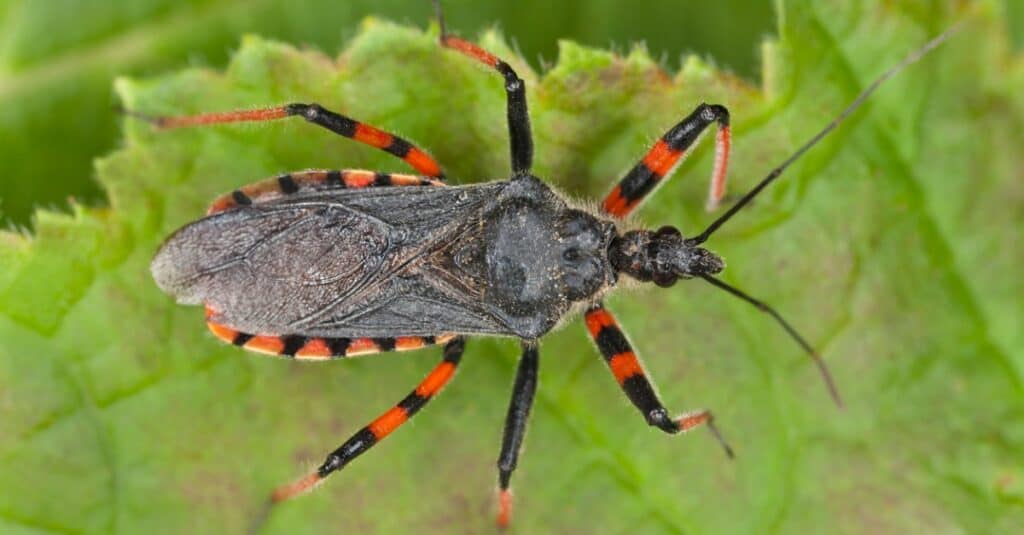
The kissing bug is known to bite humans around the eyes or mouth.
©Henrik Larsson/Shutterstock.com
1: Kissing Bug
Though tiny, kissing bugs can have a considerable impact. These insects, also known as assassin bugs or cone-nosed bugs, are most active at night and get their name from their tendency to bite humans around the mouth or eyes. Kissing bugs are found throughout the southern United States and can carry a parasitic infection known as Chagas disease. While rare, this disease can cause serious heart or digestive complications. To avoid kissing bugs, thoroughly inspect and seal any cracks or holes in your home’s exterior.
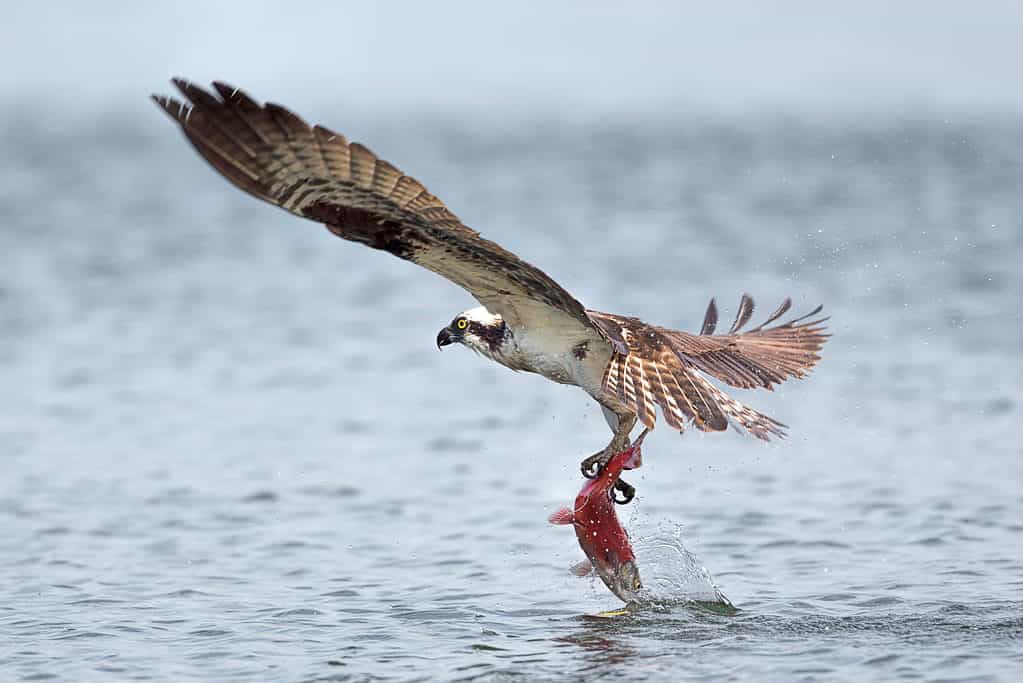
The osprey has a wing span of up to 6 feet!
©Gregory Johnston/Shutterstock.com
2: Osprey
With a wingspan of up to 6 feet, ospreys are large raptors specialized to hunt fish. These unique birds are found in coastal areas and around lakes and rivers throughout Georgia. Ospreys have extremely sharp talons and will plunge feet-first into the water to snatch up fish. They have even been known to sometimes accidentally snag people out fishing! Though not aggressive toward humans, giving these powerful hunters a wide berth for your safety is best.
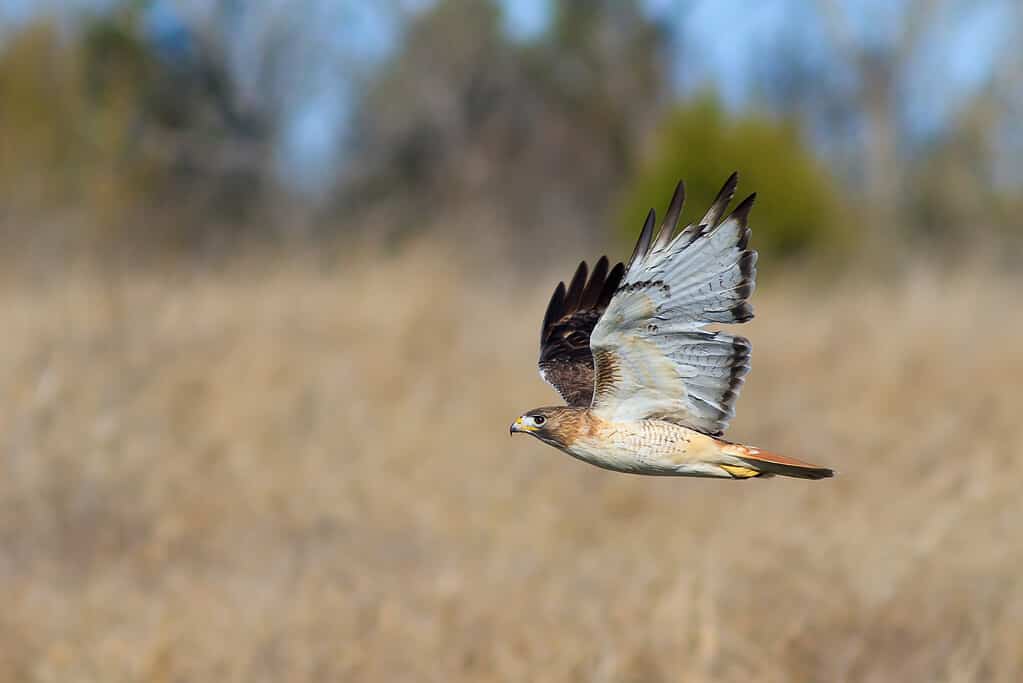
The red-tailed hawk is a common sight in the Georgia skies.
©iStock.com/cmcneill17
3: Red-Tailed Hawk
Perhaps Georgia’s most familiar bird of prey, red-tailed hawks, is a common sight across the state’s countryside. These large raptors, distinguishable by their namesake red tail feathers, hunt rodents and other small mammals. Though generally not inclined to attack people, red-tailed hawks will fiercely defend their nests and young. There have been instances where homeowners have been dive-bombed and scraped by the talons of an aggressive red-tail. Give any hawk nests a wide buffer zone for peace of mind.
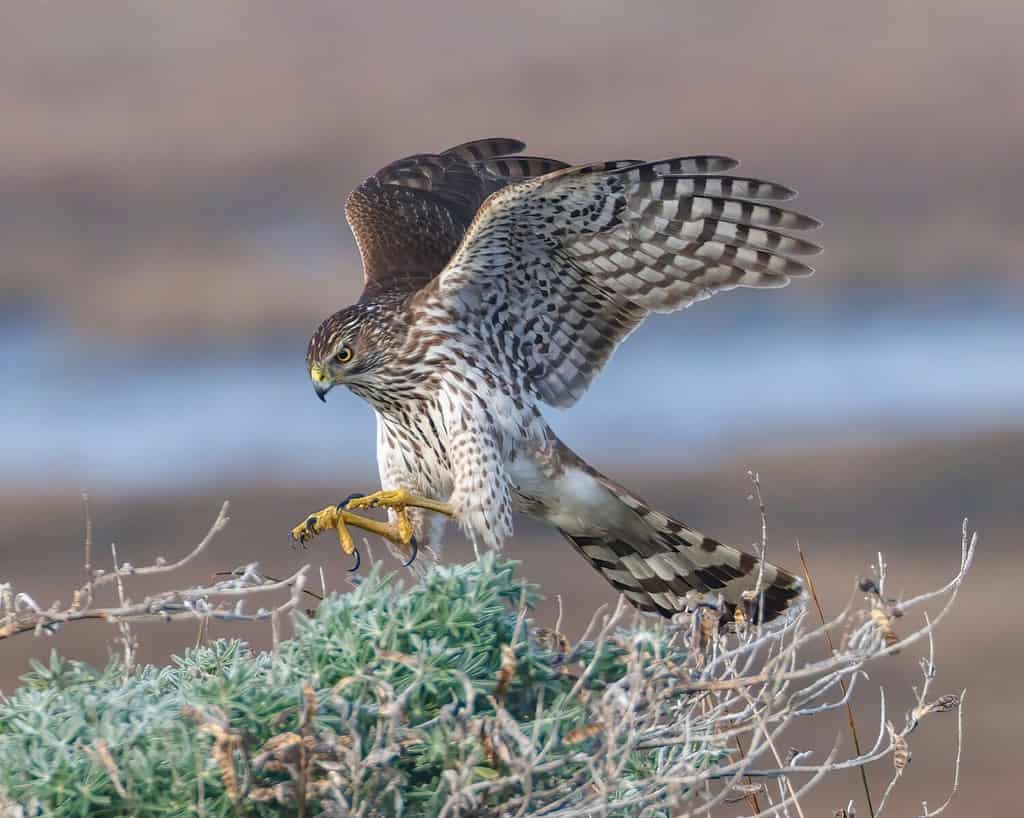
The Cooper hawk is small but mighty.
©J. S. Fisher/Shutterstock.com
4: Cooper’s Hawk
Easily mistaken for its larger cousin, the red-tailed hawk, Cooper’s hawks are small but mighty raptors found throughout Georgia. Roughly the size of crows, these agile fliers specialize in hunting birds rather than small mammals. Extremely stealthy hunters, Cooper’s hawks have even been known to pick off unwary backyard chickens. Backyard poultry owners should protect young chicks and hens within coops and runs. Around 15 inches from head to tail, Cooper’s hawks may be small but still pack a punch with their razor-sharp talons.
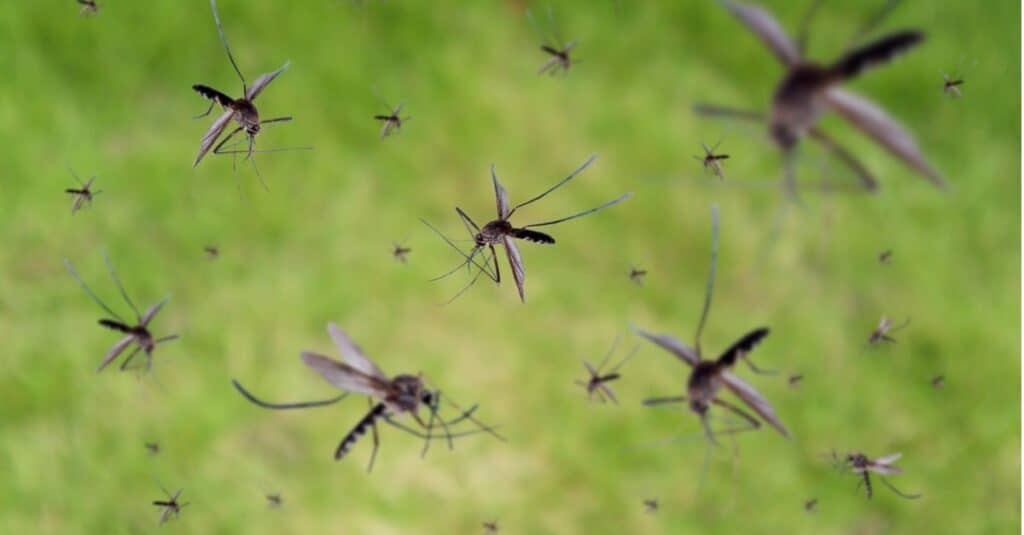
Mosquitoes are most active at dusk.
©iStock.com/Kwangmoozaa
5: Mosquitoes
Without including the ubiquitous mosquito, no list of dangerous Georgia animals would be complete. Though all species of mosquitoes are considered more nuisance than a threat, they are the deadliest animal worldwide due to their ability to spread deadly diseases like malaria, West Nile virus, and equine encephalitis. Mosquitoes breed in standing water sources like ponds and puddles. To deter them, drain any standing water in your yard and use bug spray when spending time outdoors, especially at dusk when mosquitoes are most active.
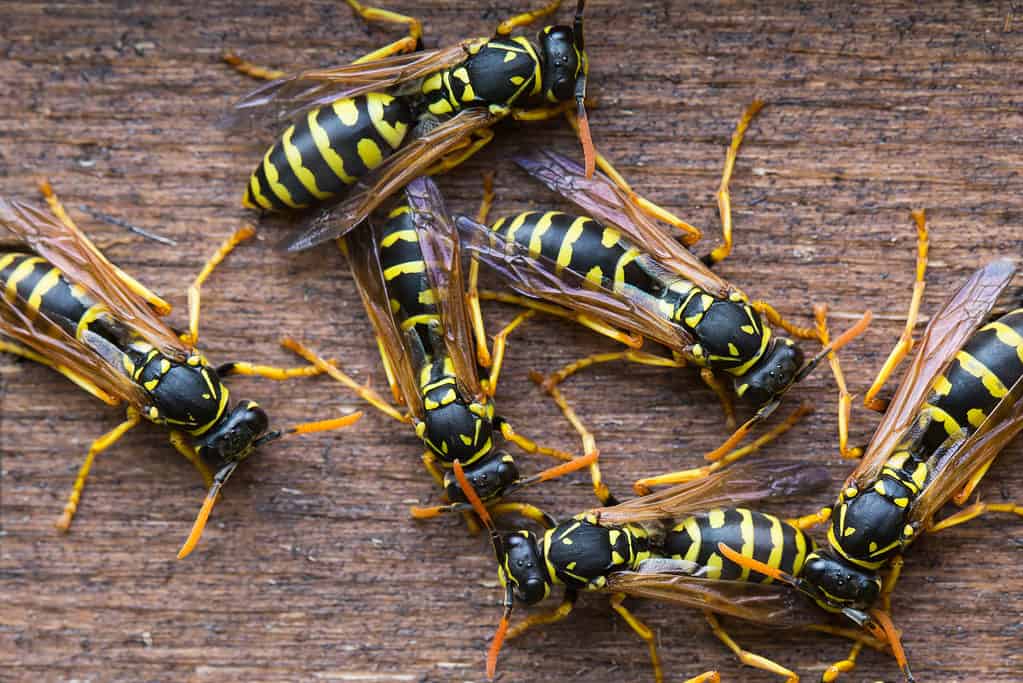
Wasps are painful and are often a nuisance.
©FCerez/Shutterstock.com
6: Wasps
Whether yellow jackets, paper wasps, or hornets, stinging insects like wasps can be a painful nuisance, especially in the later summer months. Wasps become increasingly aggressive while seeking food as colonies grow larger. Some species are known to defend their nests if disturbed viciously. Allergies to wasp stings can also develop over time, making subsequent stings increasingly dangerous. If you spot a wasp nest, leave it alone and contact a professional pest control service for safe removal.
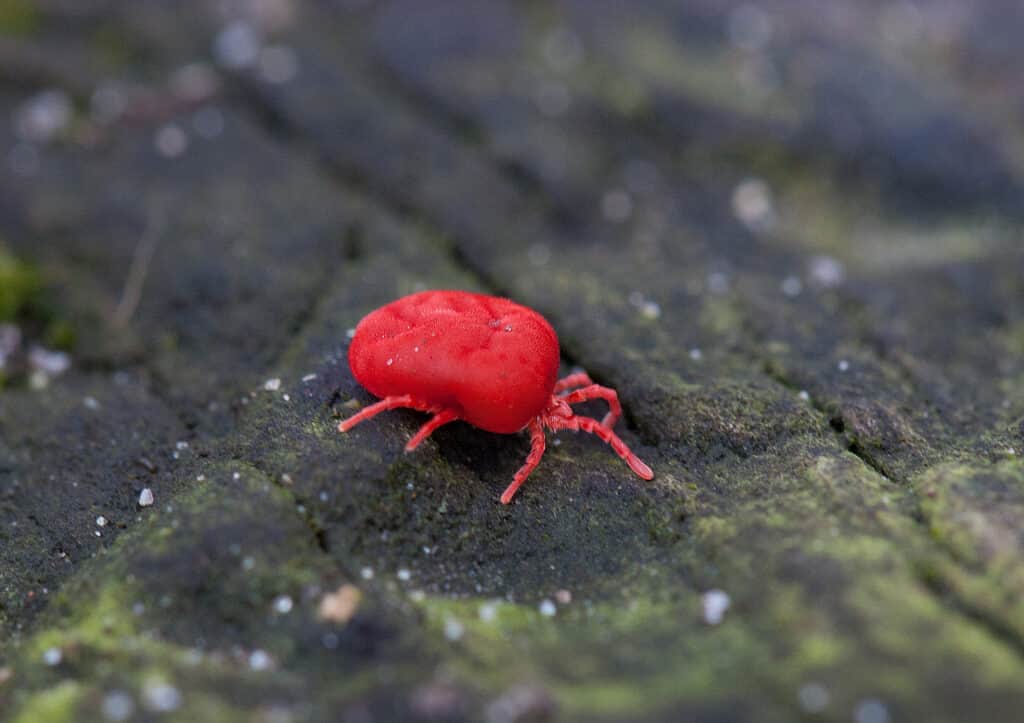
Chiggers are barely visible to the eye.
©Matauw/Shutterstock.com
7: Chiggers
Barely visible to the naked eye, chiggers are mite larvae that inhabit grassy or wooded areas. These tiny nuisances are parasites, latching onto human skin and injecting digestive enzymes that destroy skin cells. The resulting bites turn into severely itchy, red welts. Chiggers thrive in hot, humid environments. Wearing long pants and sleeves and using insect repellent can deter them, but the itchy bites are unavoidable once chiggers latch on. Resist the urge to excessively scratch, which can lead to infection.
Conclusion
Georgia’s warm, humid climate means many creepy crawlers, both large and small. But with vigilance and common sense, Georgians can stay safe from the most dangerous animals patrolling Georgia’s skies. Avoid nests, keep food sealed, and tidy yards to limit attracting unwelcome visitors. Report concerning wildlife behaviors to authorities like the Georgia Department of Natural Resources. And most importantly, remember that these animals all play important roles in local ecosystems when left undisturbed. By understanding our wild neighbors from the skies above, Georgians can happily coexist with local wildlife.
| Most Dangerous Animals Patrolling Georgia’s Skies | |
|---|---|
| #1 | Kissing Bug |
| #2 | Osprey |
| #3 | Red-Tailed Hawk |
| #4 | Cooper’s Hawk |
| #5 | Mosquitoes |
| #6 | Wasps |
| #7 | Chiggers |
The photo featured at the top of this post is © iStock.com/cmcneill17
Thank you for reading! Have some feedback for us? Contact the AZ Animals editorial team.






